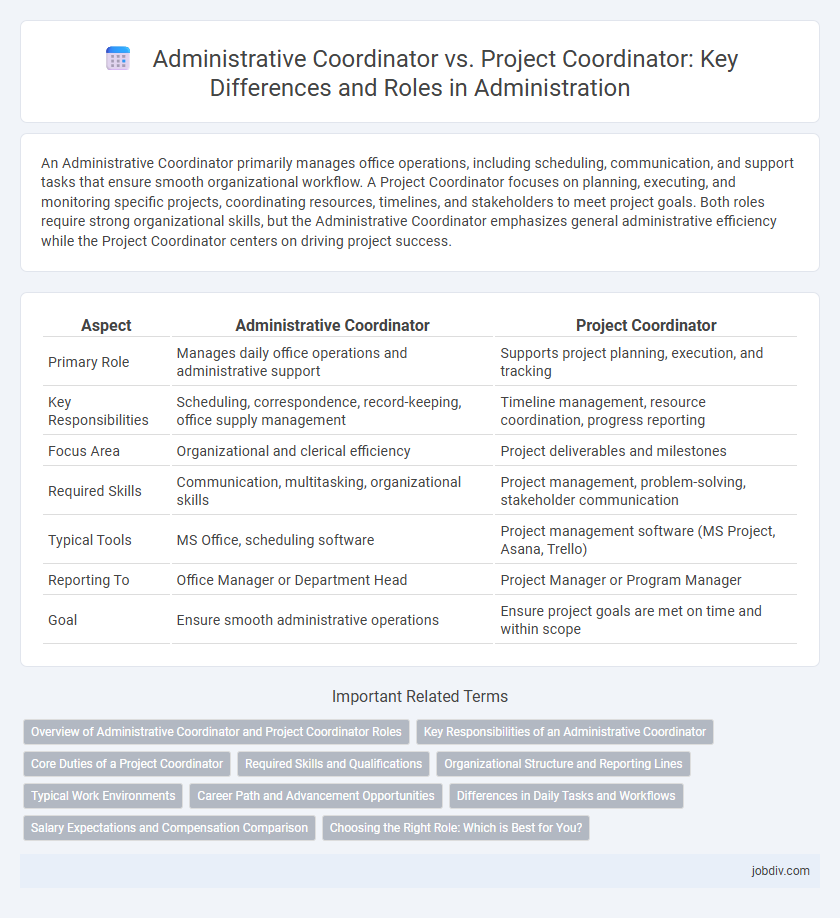An Administrative Coordinator primarily manages office operations, including scheduling, communication, and support tasks that ensure smooth organizational workflow. A Project Coordinator focuses on planning, executing, and monitoring specific projects, coordinating resources, timelines, and stakeholders to meet project goals. Both roles require strong organizational skills, but the Administrative Coordinator emphasizes general administrative efficiency while the Project Coordinator centers on driving project success.
Table of Comparison
| Aspect | Administrative Coordinator | Project Coordinator |
|---|---|---|
| Primary Role | Manages daily office operations and administrative support | Supports project planning, execution, and tracking |
| Key Responsibilities | Scheduling, correspondence, record-keeping, office supply management | Timeline management, resource coordination, progress reporting |
| Focus Area | Organizational and clerical efficiency | Project deliverables and milestones |
| Required Skills | Communication, multitasking, organizational skills | Project management, problem-solving, stakeholder communication |
| Typical Tools | MS Office, scheduling software | Project management software (MS Project, Asana, Trello) |
| Reporting To | Office Manager or Department Head | Project Manager or Program Manager |
| Goal | Ensure smooth administrative operations | Ensure project goals are met on time and within scope |
Overview of Administrative Coordinator and Project Coordinator Roles
Administrative Coordinators manage office operations, support organizational activities, and ensure efficient workflow by handling scheduling, communication, and resource allocation. Project Coordinators focus on planning, executing, and tracking project timelines, budgets, and deliverables while facilitating communication among team members and stakeholders. Both roles require strong organizational skills, but Administrative Coordinators emphasize operational support whereas Project Coordinators prioritize project-specific management tasks.
Key Responsibilities of an Administrative Coordinator
An Administrative Coordinator manages office operations, handles scheduling, and ensures smooth communication between departments to maintain organizational efficiency. They oversee document management, coordinate meetings, and support executive staff with administrative tasks. Their role focuses on optimizing internal workflows and facilitating administrative processes essential for daily business functions.
Core Duties of a Project Coordinator
A Project Coordinator manages project timelines, tracks milestones, and facilitates communication among team members to ensure alignment with project goals. They oversee resource allocation, monitor budgets, and prepare detailed progress reports for stakeholders. Their core duties emphasize coordination and support to deliver projects efficiently within scope and deadlines.
Required Skills and Qualifications
Administrative Coordinators require strong organizational skills, proficiency in office software, and excellent communication abilities to manage daily operations and support executive functions. Project Coordinators need expertise in project management tools, time management, and problem-solving skills to oversee project timelines and coordinate team activities effectively. Both roles demand attention to detail, multitasking capabilities, and the ability to collaborate across departments.
Organizational Structure and Reporting Lines
Administrative Coordinators typically oversee internal office functions, managing schedules, resources, and communication within the organizational structure, reporting directly to office managers or department heads. Project Coordinators focus on specific project timelines, deliverables, and cross-functional teams, often reporting to project managers or program directors. The distinction in reporting lines underscores the Administrative Coordinator's role in maintaining operational efficiency versus the Project Coordinator's responsibility for project execution and alignment within project-based frameworks.
Typical Work Environments
Administrative Coordinators typically work in office settings within corporate, healthcare, or educational institutions, managing clerical tasks and supporting organizational operations. Project Coordinators often operate in dynamic environments such as construction sites, IT firms, or marketing agencies, focusing on project planning, scheduling, and resource allocation. Both roles require strong communication skills but differ significantly in their work environment due to the scope and nature of their responsibilities.
Career Path and Advancement Opportunities
An Administrative Coordinator typically advances through roles in office management, executive assistance, or operations coordination, gaining expertise in organizational processes and team support. Project Coordinators often move toward project management positions, focusing on planning, execution, and stakeholder communication within specific industries. Career advancement for Administrative Coordinators involves broader administrative responsibilities, while Project Coordinators develop specialized project leadership skills for higher managerial roles.
Differences in Daily Tasks and Workflows
Administrative Coordinators manage office operations, handle scheduling, and facilitate communication between departments to ensure organizational efficiency. Project Coordinators focus on planning, tracking, and delivering project milestones by coordinating resources, timelines, and stakeholder updates. While Administrative Coordinators maintain general office functions, Project Coordinators concentrate on specific project execution and progress management.
Salary Expectations and Compensation Comparison
Administrative Coordinators typically earn an average salary ranging from $45,000 to $60,000 annually, reflecting their role in overseeing office operations and supporting executive staff. Project Coordinators command a slightly higher salary bracket, usually between $50,000 and $65,000, due to their responsibility for managing project timelines, budgets, and stakeholder communications. Compensation packages for Project Coordinators often include performance bonuses and project completion incentives, whereas Administrative Coordinators may receive benefits focused on office management efficiencies.
Choosing the Right Role: Which is Best for You?
An Administrative Coordinator primarily handles organizational support tasks such as managing office operations, scheduling, and communication flow, ideal for individuals who excel in multitasking and office management. A Project Coordinator focuses on planning, executing, and tracking project activities, suited for those with strong skills in project management tools, timeline adherence, and stakeholder coordination. Choosing the right role depends on your strengths in administrative support versus project-focused responsibilities and your career goals in organizational or project management.
Administrative Coordinator vs Project Coordinator Infographic

 jobdiv.com
jobdiv.com